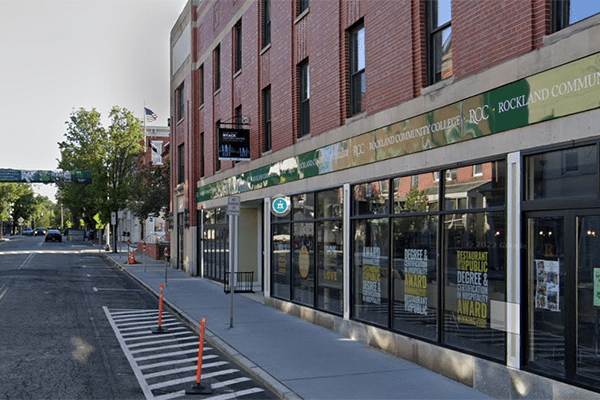|
RCBJ-Audible (Listen For Free)
|
New City’s Burger Loft/District 96 Plans To Open In Shuttered RCC Market On Broadway & Main In Nyack
By Tina Traster
The corner of Broadway and Main in Nyack – the nexus of the river village – suffered two blows in 2023: the shuttering of Starbucks in September and the failed ground-floor food and retail market in the Rockland Community College building that lasted less than two years.
Increasingly a raft of restaurants/bars and stores radiating along both Main and Broadway have packed it in – in some instances the spaces are for lease, in others the buildings are for sale. On the upside, RCC’s former Hudson Market on Main has been leased by Burger Loft/District 96, the seasoned New City pub and brewer, which is expected to open in the spring.
The growing roster of empty storefronts has become a subject of conversation among business owners, real estate brokers, public officials, and residents but there is not one single factor that defines the 20 to 30 percent vacancy rate downtown. Some believe Nyack’s economic vitality – like any small commercial district – fluctuates with times of strong demand that give way to more anemic conditions that ultimately rebound. Certainly, that has been Nyack’s long-time pattern, leading observers to say the underperforming commercial retail market today will tick up again. In the summer 2021, a wave of new tenants filled spaces left darkened by the pandemic.
“I would say this is an area of concern, not an area of alarm,” said newly elected Mayor Joe Rand, who has worked in the real estate sector for decades. “There are a higher number of vacancies than normal but each of these spaces has a different story.”
“It’s a culinary-driven town that doesn’t have enough retail diversity,” said Travis Koester, co-owner of The Henry and The Local.
In some cases, tenants who have vacated were ready to retire. In others, their restaurant or retail concept, however aspirational, missed the mark. The building at 112 Main Street (former site of Sign of the Times/Alumni Skate Shop) was sold in 2019 and was caught up for years in litigation over an illegal basement boiler removal and toxic effluence released into the sewer system. That case has reached an undisclosed settlement. Some businesses failed for internal management reasons; others couldn’t make the rent, which brokers say average about $35 per square foot but can rise as high as $55 per square foot.
“A bunch of things have happened at the same time but there’s no connective tissue,” said Rand.
Based on an informal survey, there are upward of 15 vacant spaces downtown, most of which had previously functioned as a restaurant/bar or a food establishment, and some that have been darkened for a year or more. At least two buildings have notices hung on their exterior walls that say: “Unsafe Building.” Notably Nyack has lost Communal Kitchen, Nyack Grill & Bar, Marlowe Artisanal Ales (formerly the Two Villains location), Olives, Dragon Den & Dungeon Hall, Brick House, Up Lounge & Restaurant, and others. But there are newcomers on the scene like Corner of Ukraine, Nyack Social, and Himalaya Tibetan Momo.
The closing of the Village Market dealt a gut punch but the opening of Nyack Fresh marks the first time the village has had a full-blown supermarket in decades.
“Starbucks going dark was a blow,” said Rand. “We have independent coffee shops but having a Starbucks – and we were really the only river town (in the lower Hudson Valley) to have one – leant a certain cache. It meant something. I think its departure had a psychological aspect; it amplified concern” about the village’s downtown.
Indeed, Starbucks’ departure is more emblematic of a national company rethinking its corporate goals and focusing on takeout and drive-thru formats rather than its possible poor performance in the small village. But the challenges seen in the village speak to a universal instability in the food and beverage industry, which is struggling with higher raw costs, labor shortages, higher minimum wage, and a change of post-pandemic lifestyles that many say continue to curtail the appetite for eating out. Add to that the chicken-and-egg conundrum restaurant owners face when trying to decide whether it makes sense to open for lunch. A glut of office space and a dearth of daytime workers has forced most restaurants to limit themselves to dinner service, which in turn, leaves the village quieter during weekday hours.
“It’s hard to say that it’s any one thing,” said a landlord who preferred not to be named, but added many of the root causes of the fluctuation are reflected regionally and nationally as the nation continues to redefine a post pandemic world. “More people work from home, they’re not going out as much,” the landlord said, adding this business cycle in the village is exacerbated by a sense that Nyack has become a place for aggressive panhandling and that stronger enforcement is needed for people to feel safe.
Paul Adler, Chief Strategy Officer of Rand Commercial, who estimates about a 20 to 30 percent vacancy rate downtown, believes a more sustainable mix of tenants is needed to make the village a greater magnet for locals and tourists alike even though he points to interesting additions like Big Red Bookstore, Hippy Dippie Threads, and a proliferation of thrift and second-hand stores over the past year or so. “When all you see is restaurants, and not enough interesting stores, the appeal of Main Street gets diminished. It’s all about the tenant mix,” Adler said.
This is another chicken-and-egg conundrum because Nyack has built a reputation on being a foodie hub but those who make downtown a destination typically want to stroll, shop, and experience a balanced eco-system in a location that strings together its assets, promotes its charm, and offers art and culture.
“It’s a culinary-driven town that doesn’t have enough retail diversity,” said Travis Koester, co-owner of The Henry and The Local, two restaurant/bars. “There are about 50 or so spaces with most competing in the food and beverage industries. There are not enough boutiques, clothing stores, or other kinds of retail. The offices are empty. There’s not enough foot traffic.”
A compromised commercial downtown can be a detriment to attracting locals and tourists alike. Nyack is depended upon as Rockland County’s tourism magnet – a gateway that impacts tourism in the village and beyond. The county recently awarded Visit Nyack, a nonprofit, $25,000 to fund advertising campaigns to lure visitors. Visit Nyack typically wins the largest of the county’s tourism awards year after year.
Rand said the village works with the business community to help ensure its success. He cited recent efforts to donate more parking to Nyack Fresh, which involved foregoing some of Nyack’s parking revenue. The mayor also said efforts to streamline the approvals process for signage should help businesses. A newly formed group, The Business Council, which Rand sits on, is working to energize the business community.
Meanwhile, John Potenza, co-owner of Burger Loft, said he has confidence in Nyack; in fact the restaurant group was planning to open a location in Piermont but switched course because it thought Nyack made more sense.
“We’re not worried about the vacancies,” said Potenza, whose group runs Burger Loft/District 96, Blue Fig, and Ciseros Pizza Parlor. “Communities go through waves. This is a low wave right now. It will come back. Pearl River is busy. New City is busy. We believe our concept will work in Nyack.”














